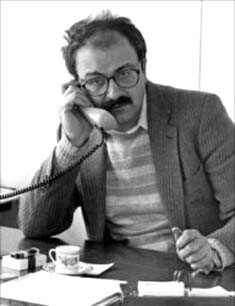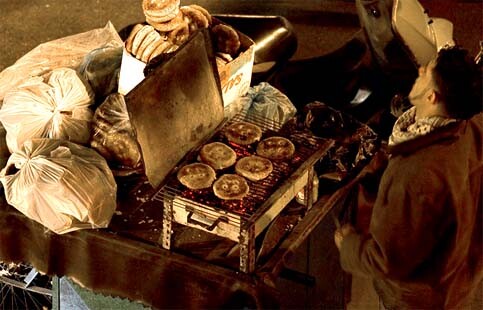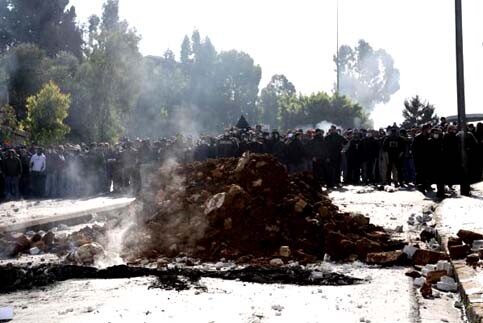Electronic Lebanon 28 March 2007

Joseph Samaha, 1949-2007 is the former editor of the Lebanese newspaper Al-Akhbar.
“Culture of death” is the key phrase for the downtown sit-in used by government leaders attempting to undermine all it represents. A Lebanese political figure utilized this exact description and added, while sitting comfortably protected by his ferocious regional and international allies; “they won’t pass”, echoing the historic cry “no pasaran”, a cry that is supposed to be the exclusive right of those in Lebanon who didn’t allow the Israeli aggression to pass.
This March 14th leader is armed with simplistic readings of Lebanese politics based in western thought and didn’t prevent the superficiality of his description from propagating. Quickly the head of the Parliamentary cabinet began claiming that “most Lebanese choose the culture of life and not the culture of death”. Another March 14th leader, with a bloody military history, further explained the meaning through accusing opposition protesters of transforming Lebanon into a country of “poverty and poor people”, while adding that the main concern of the demonstrators is to spread “a philosophy of poverty, non-prosperity and death”. It is very evident how “death” and “poverty” are interrelated in the basket of accusations aimed at the opposition “insurrectionists”.
When these adjectives are parachuted upon us and quickly metamorphosed by major media coverage attempting to transmit to the Lebanese population what another element of the population is doing, we are on the verge of a moral scandal in Lebanon.
Here is a sample of what is being written in the major media concerning the Lebanese opposition. ‘Car stalls’, ‘shishas’, ‘shawarma’, ‘manakish’, ‘canceling festivities is a sign of the culture of death’, ‘popular markets’, ‘piles of gaseous drinks’, ‘smells’, ‘swear-words’, ‘sadistic and aggressive tendencies’, ‘glare, glower and grieving’, ‘hatred of life’, ‘as if they do not belong to this country’, ‘animosity to the logic of shacks and dearth’, ‘rubbish’, ‘pavements that looks like poor stalls’, ‘disfiguring the walls’, ‘a yard for the homeless, the movable merchants, the gangsters, the wretched, the scanty and the silly lumpen-proletariat’, ‘the baggers, coffee and bagel salesperson, owners of meager booths’, etc…
That is only part of a rich vocabulary.

Food carts in central Beirut serving thousands of opposition protesters gathered in Beirut in early December 2006. (Photo: Blogging Beirut)
We are faced with a lebanised class hatred, one that reintroduces sectarian ideological stereotypes, and that inhales from a racial pool of right-wing arrogant consciousness. It is clear that this hatred is not directed toward poverty but at poor people including all the acts, behaviors, aggressive and destructive tendencies that are delusively attributed to them, in a context where social belonging is intertwined with confessional identity.
A specific type of person repeats this type of social evaluation, those who are willing to betray a past of misery in order to exceed all others. Striving to live an illusion, individuals are adopting a supercilious self-portrait which exercises superiority over the “meagerness” of the poor in Lebanon. They acquire their “superior” status through “individual” success usually achieved through opportunism. One is forced to erase much of their dignity in order to achieve this degree of “progress”.
The disturbed petty bourgeois is the only one capable of having this kind of outlook. It usually reflects ones personal fear of poverty and a resentment toward the poor based on a fresh memory of once being poor. This resentful view is an element of a suppressed wish for elevation and a desire for mimicking those of a “higher class”. Since it is a suppressed wish the individual contends to offering his services hoping to be accepted into the elite.
That is not the typical behavior of a true bourgeois or a descendant of a “well-respected” family. It is closer to the attitudes of the “nouveau riche” or to a culture spread by “fast wealth”, which often results in indulgent people fearing being viewed as what they used to be and not as what they have become. They always retain a class passport that is not valid for those who inherit a more advanced social status, and they hate those who they resemble because they disgrace themselves in front of their masters.
Those who are familiar with the ABC’s of the motivations that supplied the fascist parties with their most extreme and bloody elements, discover in certain Lebanese, through their disgrace toward poverty, a reservoir for party fascism.
Fascist parties were formed of neither workers or of patrons. The backbone was the type of person who stepped out of the working class and quickly became connected with the patrons wanting to illustrate their hatred for their original social environment, longing to put their violence into service even when the violence is verbal.
Certain political actors in Lebanon believe that they can change their social belonging by shifting political allegiances which is a ridiculous idea. Such actors are furious towards Riad Solh Square [where Hezbollah protest tents are located] while dubious towards Martyrs square [where the Free Patriotic Movement and other Christian party tents are located] because the latter is a lost haven that was expected to produce a different political position. What doubles their crises is the fact they have to deal with an incomprehensible “confessional disappointment” in addition to their bitter class disappointment.

Opposition protesters stand beyond a burning road blockade during the national strike in January 2007. (Photo: Blogging Beirut)
They hate the protest movement because it is disorganized. They would have hated it if it was organized. They hate the “culture of death” but approve a political discourse that wants to reorganize political life around martyrs and a decisive priority of revenge. They contest the protests as costly but disregard the fact that previous protests were as costly. They consider the central protest (organized by the Lebanese opposition) as shameful and they see no shame in the peripheral protests (organized by the government supporters).
The anti-protest campaign is quiet remarkable. What is not being remarked is that the calls to stop the protests are taking place through parallel protests in the Bekaa, the North and the Mountains. This observation is only a formal one. The essential remark is that the crowds protesting in response to pro-government calls are formed by exactly the same category of people that forms the pro-opposition crowd in down-town Beirut. Those who watched the supportive crowds in the government palace have surely noticed the similarity with the protesters gathered few meters away, similarities in the faces, traits, clothes (not in all cases), gestures, slogans, vocabulary … Even Fouad Siniora began to transform from a cold bureaucrat into a populist leader, his body gestures began to resemble those of a blazing orator.
The participants in the pro-government protest called upon by the Future Movement, and the visitors to the government palace (in support of the Siniora government) are probably those who’s concrete needs have never been considered by the Future Movement or the governmental palace. Nevertheless they are driven by a certain dedication, and one can bet that this dedication is much more related to a blue (the colour of the Future Movement) tainted incitement rather than to Jihad Azour’s (Lebanon’s Finance Minister) latest proposed neo-liberal ratiocinations.
Aren’t we implicating known facts? What are the objectives of political parties in aligning an impoverished public with a dominant political class? What is the name given to such political leaders and parties? The answer might be fascism. There exists a sectarian bottom to the confrontation taking place today in Lebanon. But we are in Lebanon, where such confrontations can lead to unrelated tensions. We are not going to ask the “Socialist International” (Walid Jumblatt’s Progressive Socialist Party is a member organization) to understand these complexities. The “Socialist International” bares an innate structural dysfunction: an indescribable passion for colonial wars.
Joseph Samaha, 1949-2007 is the former editor of the Lebanese newspaper Al-Akhbar who passed away earlier this year at the age of 58 in London England. Samaha was a renowned journalist in the Middle East known for his integrity and clear-sighted secular views.
This article originally appeared in Al-Akhbar newspaper in Arabic and was translated to English by Ziad Najjar exclusively for Electronic Lebanon.


